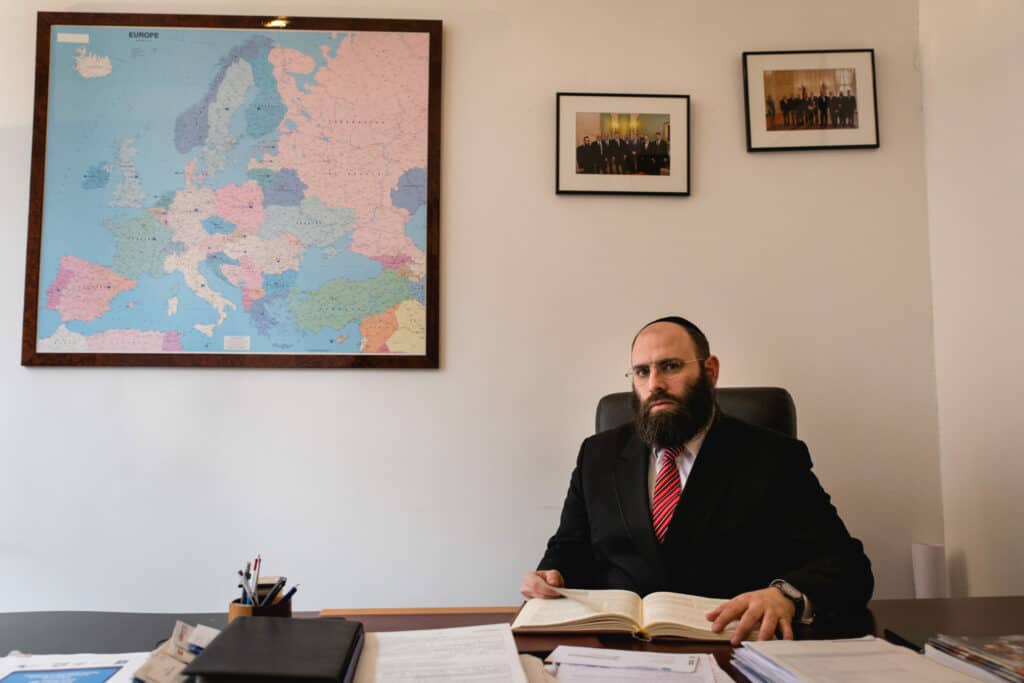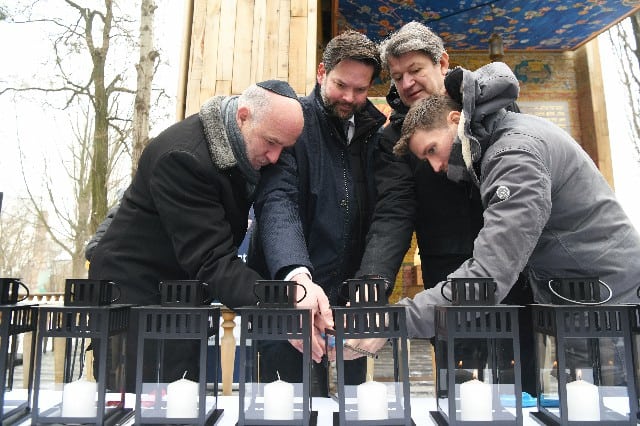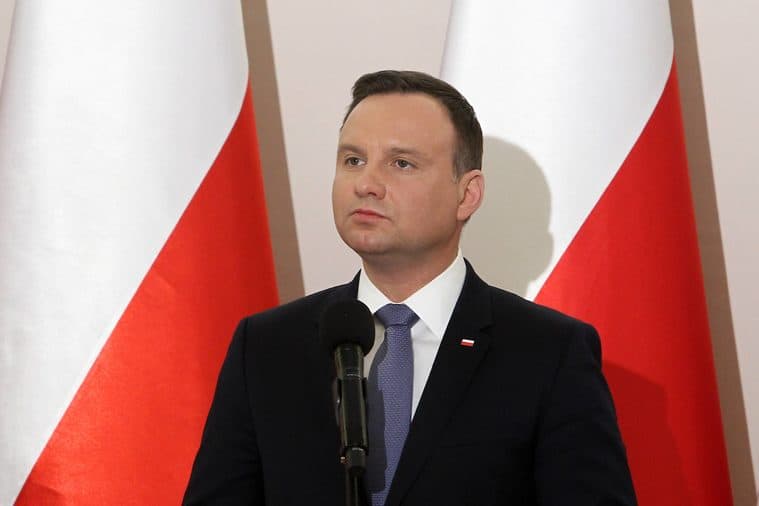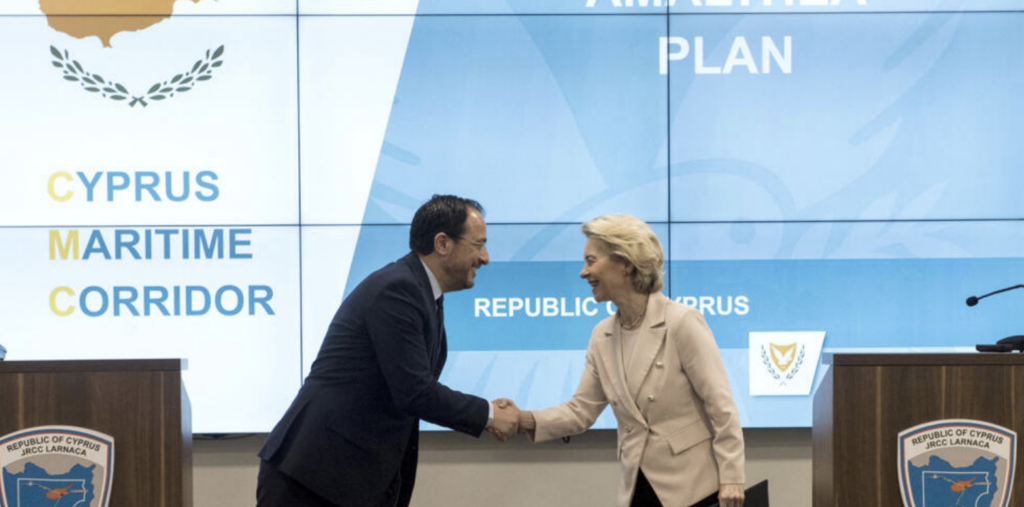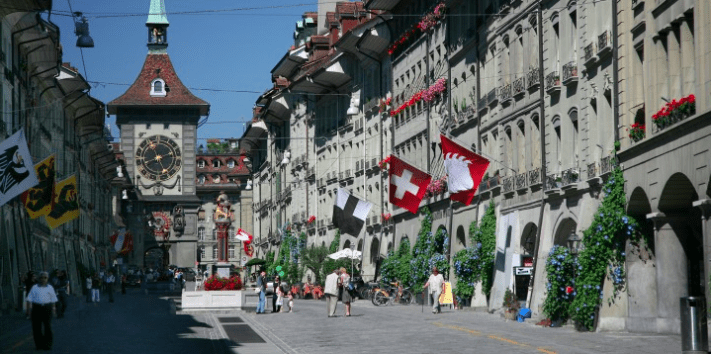Top European rabbi tells Israel Hayom a special center to monitor real-time incidents via remote feeds could be established in order to tackle anti-Jewish attacks.
The recent terrorist attacks in Austria and France, as well as the spike in coronavirus cases in Europe, has created a fear among Jews in the continent that anti-Semitic conspiracy theories blaming Jews for the spread of the pandemic could become mainstream.
A recent study in Germany showed that one in three Germans has somewhat of a conspiratorial view of the world.
Felix Klein, who is the federal commissioner for Jewish life in Germany and the fight against anti-Semitism, told Israel Hayom that the recent protests against the COVID-19 regulations have become fertile ground for anti-Jewish sentiment.
“The current protests against corona-related restrictions serve as a rallying point for antisemites, Holocaust deniers, and believers in conspiracy myths. At “hygiene protests”, participants downplay the Holocaust by, for example, comparing the current requirement to wear a face mask with the obligation to wear a Star of David during the Nazi regime,” he told Israel Hayom. “Portraying themselves as rebels – as do for example the supporters of the new political party Widerstand2020 (Resistance2020) and the Reichsbürger movement – is typical of adherents to anti-Semitic beliefs: Presenting oneself as breaking taboos, as ‘finally’ bringing the truth to light, as showing at last who is pulling the strings behind the scenes – and, as has been done for thousands of years, pointing their fingers once again at Jews,” he added.
When asked about the danger posed by such conspiratorial views, he noted that there is a concern verbal statements could eventually morph into action.
“Conspiracy myths also prepare the ground for violence, as history has shown. Those who perceive themselves as victims and feel threatened can themselves turn into a threat. Anti-Jewish pogroms throughout history have been the fatal consequence of such obsessive hatred of Jews, as have the antisemitic terrorist attacks worldwide in recent years,” he said. “A recent study has shown that radicalization online takes place four times faster than offline. That is what makes it so important to quickly adjust our laws. This is the thrust of the package of measures put forward by the federal government. I am confident we can achieve a lot through a combination of repression and education. After all, what is ultimately at stake is social cohesion in times of crisis.”
Meanwhile, Jewish groups have scrambled to deal with the threat of rising anti-Semitism in the age of coronavirus. The group “Concert – Together for Israel” strives to bolster Israel’s image and fight modern anti-Semitism, says its job has been made much more difficult in the wake of the pandemic, and many pro-Israel groups are facing potential elimination.
“Generally speaking, one can say that small organizations that rely on a small staff expect a slowdown and a long recovery, but the big organizations that need a large operation worry about their long-term viability in light of the added costs,” Nava Edelstein, the group’s program director says.
Rabbi Menachem Margolin, the head of the Brussels-based European Jewish Association that has led a comprehensive effort to counter anti-Semitism in Europe, told Israel Hayom that he has been overseeing a “virtual command center” that gets daily updates from Jewish communities on online anti-Jewish attacks.
“We constantly see how anti-Semitic voices on the web attribute the virus to a Zionist-Jewish conspiracy, on top over other forms of anti-Semitism that involve graffiti and vandalizing of Jewish institutions,” he said, adding the largest volume of reports originates in France, Romania and Belgium.
“We are considering setting up a center that would monitor events through Jewish communities’ video feeds in real time, so that we can alert security forces when such incidents happen,” he revealed.
The article was published in Israel Hayaom
“We are now very close to opening this corridor, hopefully this Saturday-Sunday and I’m very glad to see an initial pilot will be launched today,” said European Commission Ursula von der Leyen a visit to Cyprus where she met Cypriot President Nikos Christodoulides.
Israel on Friday welcomed the inauguration of a maritime corridor from Cyprus to the Gaza Strip.
‘’The Cypriot initiative will allow the increase of humanitarian aid to the Gaza Strip, after security checks are carried out in accordance with Israeli standards,’’ a satement from the Israeli foreign mionistry said.
‘’Israel will continue to facilitate the transfer of humanitarian aid to the residents of the Gaza Strip in accordance with the rules of war and in coordination with the United States and our allies around the world.’’
The statement added that Israel ‘’will continue the fight against Hamas — an organization that calls for the destruction of the State of Israel and carried out the 7 October massacre — until its elimination and the return of all the hostages.’’
‘’It is very important that additional countries join the Cypriot initiative and the international effort to transfer aid,’’ the foreign ministry said.
On the same day, the European Commission, Germany, Greece, Italy, the Netherlands, the Republic of Cyprus, the United Arab Emirates, the United Kingdom, and the United States announce their intent to open a maritime corridor ‘’to deliver much-needed additional amounts of humanitarian assistance by sea.’’
‘’The humanitarian situation in Gaza is dire, with innocent Palestinian families and children desperate for basic necessities,’’ they said in a joint statement.
“We are launching this Cyprus maritime corridor together, the European Union, the United Arab Emirates, and the United States,” Von der Leyen said after a visit to facilities in Cyprus.
“We are now very close to opening this corridor, hopefully this Saturday-Sunday and I’m very glad to see an initial pilot will be launched today,” said European Commission Ursula von der Leyen a visit to Cyprus where she met Cypriot President Nikos Christodoulides.
“The maritime corridor can make a real difference to the plight of the Palestinian people, but in parallel, our efforts to provide humanitarian assistance through all possible routes will continue,” she said in a joint press conference in Larnaca.
The sea corridor is due to formally open this weekend, with a first pilot operation to leave either on Satrday or Sunday, when the right conditions are in place.
It comes just hours after US. President Biden announced in his annual State of the Union speech that the US will set up a port on the Gaza coast to ramp up the delivery of lifesaving aid.


